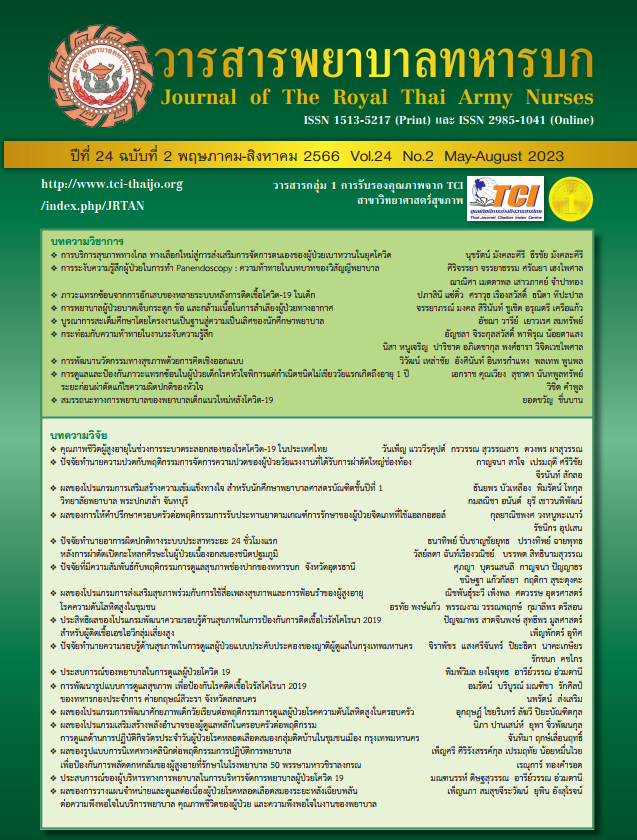The Effectiveness of a Health Literacy Development Program in Coronavirus 2019 Prevention for High-risk Persons with HIV Infection
Keywords:
Health literacy, Disease preventive behavior, Coronavirus 2019, PWHAbstract
This quasi-experimental research was a two-group pretest-posttest design. The purposes of the research were to study the effects of a health literacy development program in Coronavirus 2019 prevention for high-risk persons with Human Immunodeficiency Virus (hereafter “people with HIV” or PWH) on their health literacy and their Coronavirus 2019 preventive behavior.The samples were PWH who came to receive services at the HIV clinic of Pathum Thani Hospital. The sample was selected by Purposive sampling and put into an experimental group and a comparative group with 32 persons each. The program was based on the concept of health literacy development for PWH contributed by the National Association of People with HIV in Australia. The 6-week program activities. Research instruments were 1) a health literacy development program in Coronavirus 2019 prevention for the high-risk group of PWH. 2) a handbook of health literacy in Coronavirus 2019 prevention. 3) Questionnaires on health literacy and Coronavirus 2019 preventive behavior. The content validity indexes were .95 and 1.00, respectively. Cronbach’s alpha coefficient of the Coronavirus 2019 were .85 and .83, respectively. Data were analyzed by descriptive statistics and a t-test. The result revealed as follows: after enrolling in the program, the health literacy and preventive behavior in Coronavirus 2019 prevention of the experimental group was better than before enrolling in the program and better than the comparative group to a statistically significant degree at p-value < .05
Downloads
References
World Health Organization. World Health Statistics 2021. France: [publisher unknown]; 2021
Yuanjai A. Covid-19 with Social Stigma: The Roles of Infection Control. Journal of Nursing Science Chulalongkorn University 2020; 32(1): 89-97. (in Thai)
Yang R, Gui X, Zhang Y, Xiong Y, Gao S, Ke H. Clinical characteristics of COVID-19 patients with HIV co infection in Wuhan. Expert Review of Respiratory Medicine 2020; 15(3): 403-9.
Department of Disease Control. Coronavirus Disease Prevention and Control Guide 2019, Bangkok: Agricultural cooperative printing demonstrations; 2020.
Tachavijitjaru C. Health Literacy: A key Indicator towards Good Health Behavior and Health Outcomes. Journal of The Royal Thai Army Nurses 2018; 19(Supplement): 1-11. (in Thai)
Apinya I.Health Literacy of Health Professionals. Journal of The Royal Thai Army Nurses 2014; 15(3): 174-78. (in Thai)
Perazzo J, Reyes D, Webe A. A systematic review of health literacy interventions for people living with HIV. AIDS and Behavior 2017; 21(3): 812-21.
Wang H, Cheong P, Wu J, Van L. Health Literacy Regarding Infectious Disease Predicts COVID-19 Preventive Behaviors: A Pathway Analysis. Asia Pacific Journal of Public Health 2021; 10(1): 1-7.
Woods R. NAPWHA-HIV Health Literacy Framework-Literature. 2. Newtown: Saysana Publisher; 2019.
Glomjai T, Kaewjiboon J, Chachvara T. Knowledge and Behavior of People regarding Self care Prevention from Novel Coronavirus 2019 (COVID-19). Journal of Nursing, Public Health,and Education 2020; 21(2): 29-39. (in Thai)
Choojai R, Boonsiri C, Patcheep K. Effects of a Health Literacy Enhancement Program for COVID-19 Prevention on Health Literacy and Prevention Behavior of COVID-19 among Village Health Volunteers in Don Tako Sub-district, Mueang District, Ratchaburi Province. The Southern College Network Journal of Nursing and Public Health 2020; 8(1): 250-62. (in Thai)
Khumsaen N. Knowledge, Attitudes, and Preventive Behaviorsof COVID-19 among People LivinginAmphoeU-thong, Suphanburi Province. Journal of Prachomklao College of Nursing, Phetchaburi Province 2021; 4(1): 33-48. (in Thai)
Srisupak R, Ngampriam P, Loachai S, Srisawangwong P. The Relationship between HealthLiteracy and PracticePrevention from COVID-19 of Elderly Case Study: Waeng Nang Sub-District, Maha Sarakham Province. KKU Journal for Public Health Research 2021; 14(3): 104-11. (in Thai)
Sela C, Ratcha M, Surach A, Nakju S, Samranjit S. New Normal Lifestyles in Prevention of COVID-19 Pandemic among People in Bangkok. Journal of Sakon Nakhon Hospital 2021;24(2): 58-73. (in Thai)
Phawangkhara S, Ardchanasuk S, Namchu P. A Study of COVID-19: Situation’s Surveillance Prevention and Control in Communities towards Village Health Volunteers. The office of disease prevention and control 9th Nakhon Ratchasima Journal 2020; 27(2): 5-14. (in Thai)
Nawakaning R, Cheleng N, Salae H, Pengmak T, Niltaya T, Tongnuang P. 3E 2S Health Behaviors of the Elderly in Narathiwat Province under the Coronavirus 2019 Pandemic. Nursing Journal of the Ministry of Public Health 2021; 31(2): 68-80. (in Thai)
Sahaviriyasin U, Pheingmak, Banthip K. Development of Behavioral Modification Program Utilizing Islamic Doctrine to Promote Anti-Retroviral Drugs Adherence and Consumptive Behaviors among HIVInfected Muslim Clien.Princess of Naradhiwas Unversity Journal of Humanities and Sciences 2018; 5(1): 146-59. (in Thai)
Downloads
Published
How to Cite
Issue
Section
License
Copyright (c) 2023 Journal of The Royal Thai Army Nurses

This work is licensed under a Creative Commons Attribution-NonCommercial-NoDerivatives 4.0 International License.
บทความหรือข้อคิดเห็นใดใดที่ปรากฏในวารสารพยาบาลทหารบกเป็นวรรณกรรมของผู้เขียน ซึ่งบรรณาธิการหรือสมาคมพยาบาลทหารบก ไม่จำเป็นต้องเห็นด้วย
บทความที่ได้รับการตีพิมพ์เป็นลิขสิทธิ์ของวารสารพยาบาลทหารบก
The ideas and opinions expressed in the Journal of The Royal Thai Army Nurses are those of the authors and not necessarily those
of the editor or Royal Thai Army Nurses Association.






